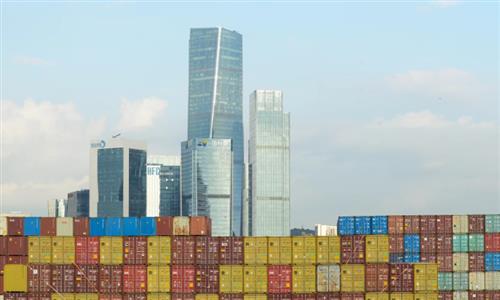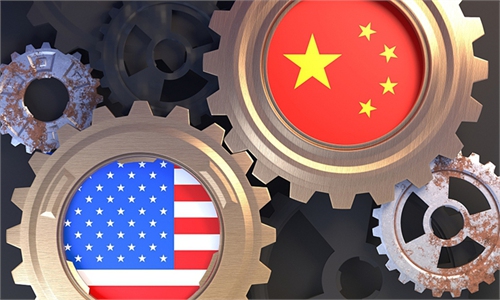US Section 301 investigation targeting China's maritime, logistics and shipbuilding industries 'groundless'
Washington urged to stop wrongdoings with 'overcapacity' fallacy

China-US Photo: GT
The China Council for the Promotion of International Trade (CCPIT) on Sunday blasted the US Section 301 investigation into China's maritime, logistics and shipbuilding industries, calling it groundless, and said it will organize industry companies to mount a legal defense to safeguard the legitimate rights and interests of Chinese companies.
Observers on Sunday slammed the Section 301 investigation, saying it is illegal and invalid, and China will take countermeasures. They stressed that the US trying to control every segment of the industrial chain is not beneficial to the country itself.
The Section 301 investigation is illegal, unilateral and invalid as it is not included in the WTO framework, He Weiwen, a senior fellow at the Center for China and Globalization, told the Global Times on Sunday.
He noted that WTO members have no right to determine if any other member violates regulations, and only the organization can make the ruling.
China's maritime, logistics and shipbuilding sectors have actively conducted technological innovation and participated in free market competition based on market development needs, which significantly contributed to the development of global trade as well as the smooth and stable operation of global supply chains, a CCPIT spokesperson said in a statement posted on its official WeChat account.
Related US research showed that the predicament of the US maritime, logistics and shipbuilding sectors was mainly caused by a lack of market competitiveness, and it had nothing to do with China's laws, policies and practices.
The CCPIT and the China Chamber of International Commerce, on behalf of China's business community, urged the US to respect market rules and the principle of fair competition, immediately stop making the wrong moves, and return to the multilateral trade system based on market rules and principles.
The spokesperson said that CCPIT will organize industry companies to make a legal defense and attend the US hearings with upstream and downstream companies, so as to safeguard the legitimate rights and interests of Chinese companies.
The remarks came after the office of the US Trade Representative (USTR) announced on Wednesday that it is initiating an investigation of acts, policies and practices of China's targeting the maritime, logistics and shipbuilding sectors for dominance after a petition filed with the USTR's office by five US national labor unions.
The USTR alleged that China is using "unfair, non-market policies and practices" to dominate those sectors, according to a USTR press release.
The US Section 301 investigation is contrary to the normal laws of market competition, while negatively affecting global enterprises' operations, Gao Lingyun, an expert at the Chinese Academy of Social Sciences, told the Global Times on Sunday.
Gao said that no country can have competitive advantages in all aspects of the industry chain. He said that the US making efforts to keep all links in the industrial and supply chains firmly in its own hands is not conducive for the country itself or for the global division of industry.
In addition to the CCPIT, Chinese authorities have already urged Washington to correct its wrongdoings while stopping the manipulation of issues related to China in the US presidential election year.
"According to the WTO ruling, the former US administration was wrong to impose additional steel and aluminum tariffs on certain WTO members and launch a Section 301 investigation and raise tariffs on China.
"Instead of correcting its mistake, the US chose to double down on it by threatening new tariff hikes and announcing a new Section 301 investigation," Lin Jian, a Chinese Foreign Ministry spokesperson, said on Friday, urging the US to be prudent in its words and deeds, and stop manipulating issues related to China in the election year.
The Biden administration is reportedly pushing for tariffs to "triple" on Chinese steel and aluminum, as Washington is targeting Chinese industries under the guise of the "overcapacity" fallacy.
Regardless of what tags the US uses for its excuses, the so-called Section 301 investigation and other tools are just malicious attempts by the US to suppress China while dismissing WTO rules.
He Weiwen said that "overcapacity" is also a problem related to US competitiveness, and he stressed the importance for the two sides to conduct dialogue including the "overcapacity" issue, based on evidence.



